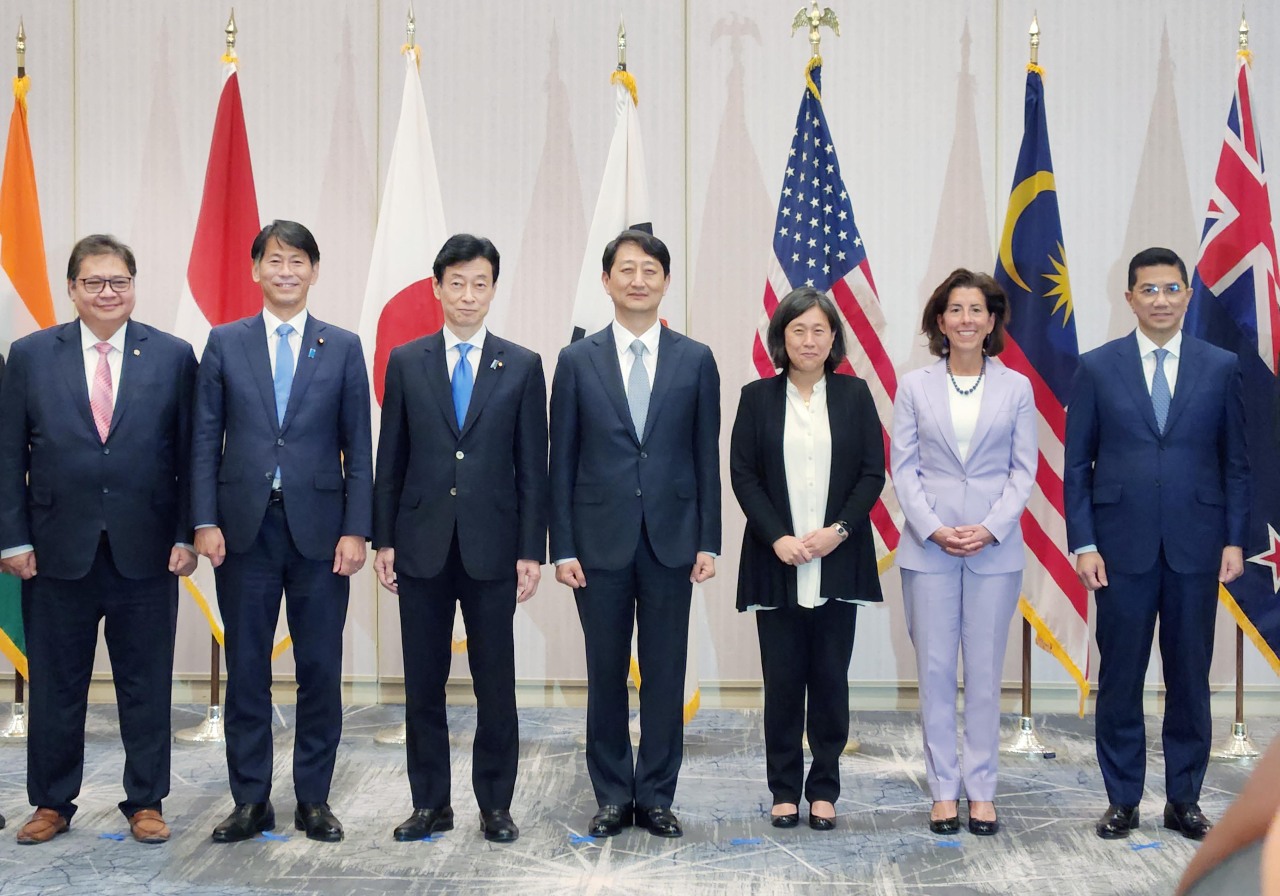IPEF members vow to boost cooperation in trade, supply chains
By Jo He-rimPublished : Sept. 12, 2022 - 17:14

South Korea and 13 other member countries of the Indo-Pacific Economic Framework kicked off negotiations for the US-led initiative to boost regional economic cooperation, prompting China to again question their intentions.
Minister-level officials of the 14 countries attended the first in-person meeting of the IPEF held for two days from Thursday in Los Angeles. There, they agreed to start formal discussions to work out details of the four main focus areas, or “pillars” of the initiative: trade; supply chains; clean energy, decarbonization, and infrastructure; and tax and anti-corruption, according to South Korea’s Foreign Ministry on Saturday.
The first in-person ministerial-level meeting was co-hosted by US Secretary of Commerce Gina Raimondo and US Trade Representative Katherine Tai.
“This meeting was a chance to deepen our partnerships and fill in the details about how we will work collectively to address the challenges and opportunities that will define the 21st century,” Tai said in wrapping up the regional event on Friday.
Raimondo also called the first in-person meeting of the IPEF members as an "undeniable success."
"I am proud of the progress we’ve made and I’m excited to continue building momentum in this effort."
Korean Trade Minister Ahn Duk-geun and Director-General Lee Mi-yon for bilateral economic affairs at the Foreign Ministry were among the Korean delegation to attend the event.
According to the foreign ministry, the member states will work together to restore supply chains in the event of disruptions, and exchange data and experiences.
They will also seek to tackle issues on energy security and share knowledge on paperless and electronic customs procedures.
On fair economies, the IPEF members are expected to address the importance of preventing double corporate taxation and also eliminating corruption.
In the 100 days since the launch of the IPEF in May, the member states have held in-depth discussions in three ministerial-level meetings and multiple meetings of high- and working-level officials, South Korea’s Foreign Ministry said.
The IPEF, first proposed by US President Joe Biden, was launched in May when he visited Japan after meeting with South Korean President Yoon Suk-yeol.
The regional initiative is widely viewed as an effort by the US to counter China's growing influence in the region and the economy. Unlike traditional economic pacts that are focused on tariff exemptions and trade benefits among members, the IPEF is largely aimed at setting common regional standards for different sectors of the economy.
The 14 member nations are South Korea, the US, Japan, Australia, New Zealand, India, Indonesia, Thailand, Malaysia, Singapore, Vietnam, Brunei, the Philippines and Fiji.
According to the Foreign Ministry, the combined gross domestic product of the participating countries represents about 40 percent of the world's GDP.
The conflict between the strategic rivals, the US and China, appears to be intensifying, as Beijing has refused to accept Washington's claim that the IPEF is not intended at keeping China in check.
On Friday, Global Times, Beijing's state-operated English media outlet, published an editorial questioning the IPEF's intentions.
"Washington's real purpose is to create a small circle of supply chains and industrial chains in the Asia-Pacific region that is 'decoupled' from China," read the editorial, titled "Washington weaponizes IPEF even before it takes shape."
Explaining how Washington has called the IPEF an initiative that “goes beyond typical trade deals” and is focused on setting new rules, the editorial said it was just a “guise” to cover up “innate deficiencies.”
"Its 'non-typical' feature is that it does not include tariff relief, market access and other arrangements, which makes it difficult for member states to obtain substantial economic benefits from it."
By Jo He-rim (herim@heraldcorp.com)








![[Graphic News] More Koreans say they plan long-distance trips this year](http://res.heraldm.com/phpwas/restmb_idxmake.php?idx=644&simg=/content/image/2024/04/17/20240417050828_0.gif&u=)
![[KH Explains] Hyundai's full hybrid edge to pay off amid slow transition to pure EVs](http://res.heraldm.com/phpwas/restmb_idxmake.php?idx=644&simg=/content/image/2024/04/18/20240418050645_0.jpg&u=20240419100350)








![[KH Explains] Hyundai's full hybrid edge to pay off amid slow transition to pure EVs](http://res.heraldm.com/phpwas/restmb_idxmake.php?idx=652&simg=/content/image/2024/04/18/20240418050645_0.jpg&u=20240419100350)

![[Today’s K-pop] Illit drops debut single remix](http://res.heraldm.com/phpwas/restmb_idxmake.php?idx=642&simg=/content/image/2024/04/19/20240419050612_0.jpg&u=)